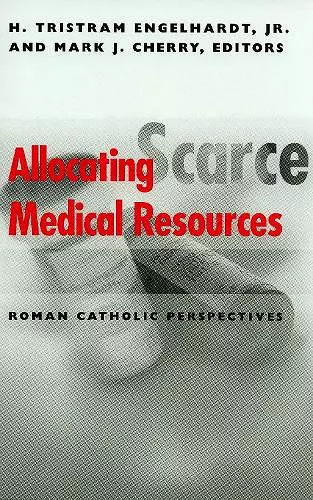Allocating Scarce Medical Resources
Roman Catholic Perspectives
H Tristram Engelhardt, Jr editor Mark J Cherry editor
Format:Paperback
Publisher:Georgetown University Press
Published:20th May '02
Currently unavailable, and unfortunately no date known when it will be back

"Every chapter will be a 'must-read'—not only for those interested in what Catholic moral thought has to say about the allocation of health care resources, but also for those concerned about what makes Catholic health care 'Roman Catholic' and those who seek greater insight into and appreciation for the contribution of Catholic moral thought to public policy."
Roman Catholic moral theology is the point of departure for this multifaceted exploration of the challenge of allocating scarce medical resources. This title begins its exploration of discerning moral limits to modern high-technology medicine with a consensus statement born of the conversations among the contributors.Roman Catholic moral theology is the point of departure for this multifaceted exploration of the challenge of allocating scarce medical resources. This volume begins its exploration of discerning moral limits to modern high-technology medicine with a consensus statement born of the conversations among its contributors. The seventeen essays use the example of critical care, because it offers one of the few areas in medicine where there are good clinical predictive measures regarding the likelihood of survival. As a result, the health care industry can with increasing accuracy predict the probability of saving lives - and at what cost. Because critical care involves hard choices in the face of finitude, it invites profound questions about the meaning of life, the nature of a good death, and distributive justice. For those who identify the prize of human life as immortality, the question arises as to how much effort should be invested in marginally postponing death. In a secular culture that presumes that individuals live only once, and briefly, there is an often-unacknowledged moral imperative to employ any means necessary to postpone death. The conflict between the free choice of individuals and various aspirations to equality compounds the challenge of controlling medical costs while also offering high-tech care to those who want its possible benefits. It forces society to confront anew notions of ordinary versus extraordinary, and proportionate versus disproportionate, treatment in a highly technologically structured social context. This cluster of discussions is enriched by five essays from Jewish, Orthodox Christian, and Protestant perspectives. Written by premier scholars from the United States and abroad, these essays will be valuable reading for students and scholars of bioethics and Christian moral theology.
Every chapter will be a 'must-read'-not only for those interested in what Catholic moral thought has to say about the allocation of health care resources, but also for those concerned about what makes Catholic health care 'Roman Catholic' and those who seek greater insight into and appreciation for the contribution of Catholic moral thought to public policy. Health Progress Offers a vigorous dialogue regarding the interplay of numerous moral rationalities, not simply a reworking of questions regarding the interplay of faith and reason. This is a collection of essays that fruitfully encompasses a plurality of views often in foundational and impassioned disagreement but nevertheless in dialogue. Readers of whatever religion or of none, whether academic, health care professional or student, should find this a useful volume. Medicine, Health Care and Philosophy
ISBN: 9780878408825
Dimensions: unknown
Weight: 454g
344 pages